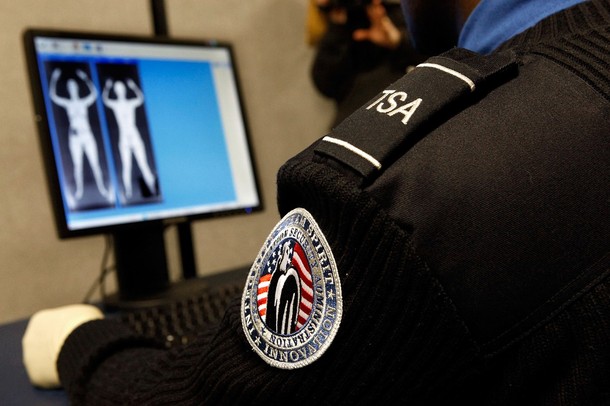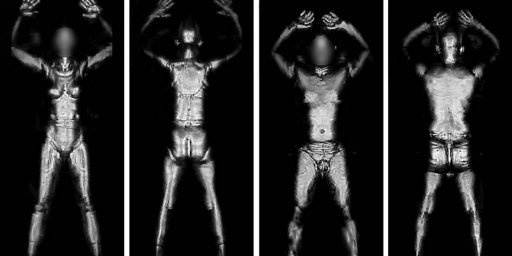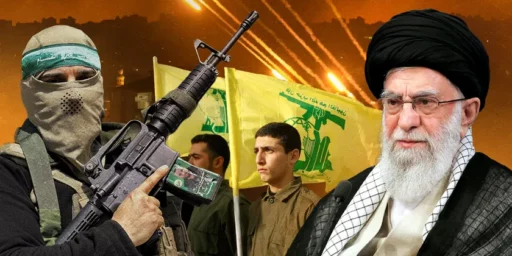Why Israeli Airport Security Won’t Work in USA

Transportation Security Administration Security Officer Nyamsi Tchapleu looks at images created by a "backscatter" scanner during a demonstration at the Transportation Security Administration's Systems Integration Facility at Ronald Reagan National Airport December 30, 2009 in Arlington, Virginia. Backscatter technology uses low level x-rays to create a two-sided image. (Photo by Chip Somodevilla/Getty Images)
One refrain we’ve heard lots of since the 9/11 attacks, with an uptick every time there’s a new incidents, is that the United States should get serious about airport security and be more like the Israelis.
FP’s Annie Lowrey recounts a personal trip through the security at Ben Gurion.
Once inside, a team of pleasant airport employees approached me and asked if we could speak for a few minutes. We moved to a table in a gated section. This was the famed Israeli airport security screening. The guards, all neatly dressed and young — most, apparently, are just out of the IDF — spoke perfect English. They questioned me for about 20 minutes, politely and intensely — why I was there, what I had seen, where had I been, who had I met with, where I had stayed. They repeated questions. They took notes. They switched off. One member went through my bag item by item, swabbing and testing for residue. Finally, she led me through a set of doors, and wished me a good flight.
No shoe removal. No lines. No cramped corners. No underpaid, overworked security guards snapping gum. The screening happened with several professional, calm, and unrushed guards standing on the other side of a table from one passenger. Here in the States, it is an angry line of passengers wending before one security agent, often with eyes glued to the bag-screening monitor or a driver’s license. The former feels like scrutiny, the latter feels like a hassle.
Presuming Americans would put up with this level of hassle, scaling it would be problematic, to say the least. Megan McArdle passes along this analysis from an Israeli:
The Israeli security model is (as noted in the article) more about the passenger than their baggage. This approach is both effective, time-consuming, and “racist”: the profilers have a conversation with each passenger; as I’m an Israeli Jew, I always get the abbreviated treatment — focusing more on where my bags have been since I’ve packed them. As a foreigner, you get a much more in-depth grilling. As a Muslim? They want to know your shoe size, and then a whole ‘nother screener comes over and asks you everything all over again, just to see that you keep your story straight. Like they say in the article, the conversations they have are not so much about what you say as how you say it. The screeners are taught to iterate a few levels deep into your story and see that it doesn’t break down under scrutiny.
[…]
The reality is that there are few enough openings that the program can be selective. I’d say, as a generalization, screeners here possess above-average intelligence, whereas your average TSA screener seems to be a working stiff, blindly following some not-too-complex screening algorithm in a three-ring binder. The number of screeners requisite for staffing all of the US airports precludes the TSA from exclusively employing screeners with the ability to make “judgment calls”. There just aren’t enough smart people with the desire to work a screener’s job in the US.
Lowrey adds:
Well, for one, the United States would need a whole lot more security guards — at least according to my back-of-the-envelope math. Say each passenger flying through a U.S. airport received on average 10 minutes of questioning from one guard. That would work out to 7.35 billion minutes, or 123 million hours, of work annually. We’d need 3 million full-time guards to perform it. That’s 200,000 more people than the total number of active and reserve military personnel, and twice the number of U.S. Wal-Mart employees. It would cost somewhere north of $150 billion a year. Sheesh.
Working the math out another way, let’s say that the U.S. decided to spend as much per passenger as Israel does, according to the Bloomberg analysis. We’d then pour around $62.2 billion a year into airport security — more than 10 times what we currently spend on airport security, and about as much as we spent fighting the war in Afghanistan last year.
Aside from the culture, manning, and cost issues — which strike me as insurmountable — the other problems with copying the Israeli model are time and space. Israel is, after all, roughly the size of a rich American’s backyard. So, not a lot of domestic flights. And not all that many flights to its nearby neighbors, either, since Israel is surrounded by hellholes full of people who hate Israelis. Americans, by contrast, fly constantly because of the vast distances between business associates and relatives. It’s nothing to get on a plane for a business meeting or holiday meal and fly back that evening.
The upshot of all this is that American airports are typically crowded. Now, imagine if we had to spend 15-20 minutes talking to each passenger to determine whether they’re terrorists. Add another two or three hours at the airport waiting to get through security. Where do you put everybody?
And, remember, we’re talking about a virtually non-existent threat. We had the 9/11 attacks, which were truly shocking because of their surprise value and the devastation they caused on the ground. In the ensuing eight-plus years, we’ve had two other serious attempts, both of which failed through a combination of stupid terrorists and proactive passengers.
We don’t know precisely how many would-be terrorists have been apprehended before they could board a plane. Since we haven’t heard about them, however, I strongly suspect that the number is less than one. After all, the feds love to hold news conferences to tout foiled terrorist plots, even ones that were at best aspirational.






gee … why do you think we have to interview every passenger ?
“be more like the Israelis” does not equal do exactly what the Israelis do …
This is a complete strawman argument … All or nothing … right …
Do the people who have hi-jacked airplanes for terrorist purposed have any trait in common. If so, screen for those traits. I heard most of the 9/11 hijackers were Arabs. On the young side and all male. Does not take rocket science to know who I would be on the look out for. I know if I were seated next to a young nervous middle eastern person on a flight, I would not be doozing off to sleep while they fiddled around for articles in a carry on bag while aboard a 777.
Nyamsi Tchapleu is the name of the TSA Security Officer?
Sure, he (or she) could be second or third generation American but somehow I doubt it.
My personal preference is that American-born citizens work for the TSA.
Terrorists adapt. Richard Reid does not fit any of these supposed profiles since he’s caucasian and traveled visa-free on a British passport. AQ has a few caucasians in its midst who they can use. In Russia, Chechen terrorists used two Russian looking women to execute simultaneous bombings of airliners in flight. Any use of profiles will just lead terrorists to go the other way. Unless you check everyone there is no way to cover everything.
Is low-incidence the same as “virtually non-existent”?
You’d need to amend the Constitution. Equal protection.
Well, I suppose we don’t know. It’s theoretically possible that several hundred al Qaeda agents are boarding planes as I type this with some newfangled butthole bomb that they’ve perfected after studying the failures of the shoe and underwear bomber.
But, heck, a lot of things are theoretically possible. I’m not sure it’s reasonable to take ridiculous measures just in case.
Another thing I saw a blogger (sorry, can’t remember who just now) point out the other day is that Ben Gurion airport has about the same level of annual traffic as Sacramento. The Detroit airport, in contrast, has more than 3x more passenger traffic. Places like NYC, Atlanta, Chicago, LAX have far more still.
So an important question to ask when assembling these Israeli comparisons is: will they really scale up to something 3x, 4x, 5x the size? At dozens of airports across the country? Is the US _really_ going to ever put that level of manpower, training, and resources into the air travel system? And before your knee jerks up to the keyboard and types “Well, let one of these jokers actually blow a plane out of the air!”, think for a moment about how many _tens of thousands_ of people that would require (gonna be a helluva jobs program), how many _years_ it would be until they were trained to actually _do_ what the Israelis do (just putting 100k people into TSA uniforms will _not_ make us safer), and then ask yourself if you’d support the tax bill that would pay for it all (I’m guessing: no).
“That would work out to 7.35 billion minutes, or 123 million hours, of work annually. We’d need 3 million full-time guards to perform it.”
I think someone missed a calculation somewhere. Even government employees work more than 41 hours per year. Using a more normal 1700 hours per year gets you below 75,000 additional employees.
So you want them to be less skilled, then?
Jeff makes the point but really, why can’t we take parts of the Israeli system or modify parts of that system? Sure profiling might miss one but it might also catch one. I would think catching one invaluable.
As for non-existent threats we should take a look at the EPA, OSHA, and various other government agencies who burden Americans with rules and regulations meant to diminish other nonexistent (or low-incidence) threats. The important thing is people want security in the air and don’t want some number cruncher saying not to worry the odds are in their favor.
Someone with a name like, oh I don’t know, Timothy McVeigh?
McVeigh was a one-off. The overwhelming majority of terrorists who target us are Muslim, male, and between the ages of 16 and 45.
The balance are Muslim women, mostly from the Middle East, and a few Caucasians.
Conclusion? We should profile, big time. This is why the Israeli model won’t work here: lack of will.
Job creation, is job creation……
I knew there’d be several bites to that comment.
But OMG you can’t blame a girl if she’d rather be “patted down” by a Tom Jones than a Nyamsi Tchapleu.
I’ve enough trouble texting the name “Tom Jones” after a couple of drinks … so there is no way the name Nyamsi would have a chance coming out even remotely discernible.
But I enjoyed all the “bites.” You guys are so very predictable at times.
“Conclusion? We should profile, big time. This is why the Israeli model won’t work here: lack of will.”
I suspect most Americans are in favor of profiling. They also watch American Idol. Security people say that if you focus on one group, it makes it easier to bypass security. Screening everyone, in some manner is the only way to go. Better intelligence so that there are fewer time consuming searches would help more.
Steve
You write like a terrorist sympathizer:)
.
Gee, Dave, my President should be “American-born” and protecting me is his #1 job … guess I just like consistency.
The main reason that the Israeli style airport security will not work is multi dimensional. 1. The ACLU, enough said. 2. Americans don’t want to be made to wait any longer than they do now. 3. Americans do not really understand security in its fullest sense. 4. They would rather something happen so that they can bitch and whine about it later. 5. Americans are too lazy and incompetent when it comes to security for anything good to work here. Bottom line is that Americans do not want to be safe, have not lived in situations where they have to be aware of life around them, and simply are too lazy to care.
As are you, my dear, as are you… 🙂